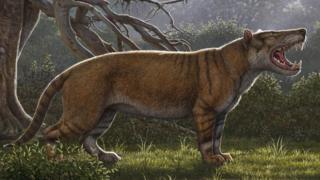‘Giant lion’ fossil found in Kenya museum drawer

 Image copyright AFP
Image copyright AFP A new species of giant mammal has been identified after researchers investigated bones that had been kept for decades in a Kenyan museum drawer.
The species, dubbed “Simbakubwa kutokaafrika” meaning “big African lion” in Swahili, roamed east Africa about 20 millions years ago.
But the huge creature was part of a now extinct group of mammals called hyaenodonts.
The discovery could help explain what happened to the group.
But they are not related to hyenas.
“Based on its massive teeth, Simbakubwa was a specialised hyper-carnivore that was significantly larger than the modern lion and possibly larger than a polar bear,” researcher Matthew Borths is quoted by AFP news agency as saying.
In 2013 he was doing research at the Nairobi National Museum when he asked to look at the contents of a collection labelled “hyenas”, National Geographic says.
The creature’s jaw and other bones and teeth had been put there after being found at a dig in western Kenya in the late 1970s.
Mr Borths teamed up with another researcher, Nancy Stevens, and in 2017 they began analysing the unusual fossil specimens.
Their findings were reported in the Journal of Vertebrate Paleontology this week.


